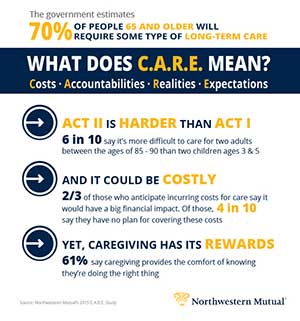
2015 C.A.R.E Study
This is proprietary research conducted by Northwestern Mutual in 2015. Use of this information is intended for reference. Northwestern Mutual's recent proprietary research is available here.
New research uncovers a number of surprising insights into the emotional and financial implications of delivering care to an elderly relative or friend. Drawn from the perspectives of both current and future caregivers, the C.A.R.E (Costs, Accountabilities, Realities, Expectations) Study finds that Americans are often unprepared for the complex and unpredictable realities of longevity and caregiving.

Download the C.A.R.E Study 2015
According to the C.A.R.E. Study, the cycle of care and dependency is a constant that extends beyond child rearing. Nearly 4 in 10 Americans (36%) either currently consider themselves a caregiver to someone aging, ill or with special needs (other than a child) or say they have performed this role in the past. Notably, the majority (59%) of Americans feel that taking care of two adults between the ages of 85 and 90 would be more difficult than managing two children, ages 3 and 5.
People want the caregiving experience to be more about chores than money, hygiene and emotions. Unfortunately it’s not.
One disconnect that emerged involved caregiving duties. When asked what people with no caregiving experience expect, they overwhelmingly envisioned their role to focus mainly around performing such chores as grocery shopping (78%), cooking (73%) and laundry (72%).
Experienced caregivers, however, tell a different story. While chores are undeniably a big part of the job, emotional support ranked equally high (83%). Financial support and personal hygiene were cited as the aspects of caregiving that cause the most anxiety.
Emotional costs are high but so are the rewards
Among people with caregiving experience:
- Three in 10 (31%) experience sadness and anxiety often/all the time
- One third feel resentment at least sometimes. Of that group, 46% say it’s directed toward the person in their care
- Nearly half say they feel tired
Despite the emotional toll, many caregivers find the experience gratifying. Some 6 in 10 Americans say caregiving does/would provide the inner comfort of knowing they’re doing the right thing, and 48% view it as an opportunity to return care and support received earlier in life. In fact, a resounding majority (81%) of current caregivers say they would do it again.
Facing the financial realities
The financial implications of caregiving may be where the largest gap lies between perception and reality. While only 35% of inexperienced caregivers envision providing financial support as part of caregiving, when asked what they would find most difficult, financial support had the most mentions -- and the data indicates that Americans are unprepared:
- Two thirds (66%) of Americans who anticipate incurring costs for providing care say it would make a great impact financially
- Nearly 4 in 10 (38%) said they have not planned for and therefore are not covered if they were to incur costs of care for an aging family member or friend
- Among the 42% of inexperienced caregivers who say they have planned to cover caregiving costs, half say they expect to take it from their savings
- When pressed about where the money might come from if they had to provide care, close to half (48%) envision reducing discretionary living expenses, 27% said they would tap into their retirement savings and 20% said they would get another job
The 35% of experienced caregivers who have incurred financial costs suggest there can be significant financial pressure. They estimate that on average more than a quarter (26%) of their monthly budget goes towards caring for an aging family member or friend.
However, even though financial demands are a concern, people are not necessarily taking action. According to the research, among experienced caregivers who listed financial costs as their top concern about caregiving, more than a quarter (27%) say they know they need to do something but have not taken any steps while 22% have just completely avoided the issue.
November is Long Term Care Awareness Month and a good opportunity to initiate a dialogue with loved ones regarding care preferences. To learn more, visit Northwestern Mutual’s lifespan calculator and LTC cost of care calculator.
About the Research
The 2015 Northwestern Mutual C.A.R.E. Study explores the multiple facets of caregiving and longevity risk. This study was conducted by Harris Poll on behalf of Northwestern Mutual and included 1,308 American adults aged 18 or older from the general population, and an oversample of 297 American adults age 35-49 (for a total of 500) and an oversample of 376 experienced caregivers (for a total of 899) who participated in an online survey between September 22 and October 6, 2015. Results were weighted to Census targets for education, age/gender, race/ethnicity, region and household income. Propensity score weighting was also used to adjust for respondents’ propensity to be online. No estimates of theoretical sampling error can be calculated; a full methodology is available.